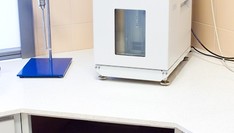In the laboratory, research is conducted on determining the physicochemical and quality properties of liquid and gaseous fuels used in internal combustion engines for transportation. Most of the work focuses on alternative fuels and blends of alternative and conventional fuels. In addition to conventional fuels such as gasoline and diesel, the studies also involve plant-based fuels, particularly vegetable oils and fatty acid methyl esters (FAME). A significant part of the research explores the potential use of ethanol as an additive to conventional fuels, especially diesel. The results obtained in the laboratory are used in studies on the operation of fuel injection systems and the working processes of piston internal combustion engines.
Specification of the main research equipment in the laboratory:
Laboratory for testing physicochemical and quality parameters of liquid and gaseous fuels:
- automatic apparatus for determining the fractional composition of liquid fuels – OPTIDIST, Walter Herzog, capable of analyzing the fractional composition of fuels under atmospheric distillation conditions up to 400°C,
- automatic apparatus for determining the kinematic viscosity in liquid fuels using the Ubbelohde method - HVU 482 Walter Herzog, enabling automatic viscosity measurement in the range from -40 to +100 °C) and in the kinematic viscosity range from 1.9 to 29 mm2 /s,
- precise oscillation densimeter - DMA 4500, Anton Paar GmbH, enabling accurate measurement of the density of liquids in the range up to 3 g/cm3 in the temperature range from 0 to 90 ° C,
- OptiFuel[HK1] Fourier Transform Infrared (FTIR) Spectroscopy-Based Fuel Analyzer (Diesel, Gasoline & Jet Fuel),
- automatic apparatus for determining the flash point in liquid fuels using the Pensky-Martens method - HFP 339, Walter Herzog, enabling fuel ignition temperature testing up to 400 °C,
- automatic apparatus for determining the vapor pressure in liquid fuels (Reid method) - HVP 972, Walter Herzog,
- automatic device for determining the cold filter plugging point in liquid fuels - FPP 5Gs, ISL, capable of cooling samples to approximately -90°C,
- automatic bomb calorimeter for determining the calorific value of fuels - IKA C 5000,
- automatic bomb calorimeter for determining the calorific value of fuels - IKA C 200,
- automatic apparatus for determining the derived cetane number - CID 510, used for studying the self-ignition properties of fuels by assessing the pressure increase in a constant-volume combustion chamber and determining the derived cetane number (equivalent to the cetane number),
- Agilent 6850 gas chromatograph - equipped with a defined method for determining the propane and butane content in LPG fuel,
- analytical balances – placed on a specialized anti-vibration weighing table,
- Memmert climatic chamber – operating in a temperature range from -44°C to 190°C, with internal humidity control.
Laboratory of testing tribological properties of corrosive lubricants and fuels:
- automatic apparatus for evaluating the lubricity of diesel fuel under high-frequency reciprocating rig – HFRR, PCS Instruments,
- test set for evaluating the corrosive effect of fuels on copper (for liquid and gaseous fuels)- ANKO,
- universal four-ball tester for evaluating the lubricity of lubricants – T-02U, also enabling comparative testing of fuel lubricity by measuring the seizure load force in a friction pair,
- automatic apparatus for determining the sulfur content in liquid and gaseous fuels - MultiTek Antek,
- automatic apparatus for determining the water content in fuels by coulometric method - Karl Fischer Titrator, AquaMAX KF, GR Scientific Ltd.









